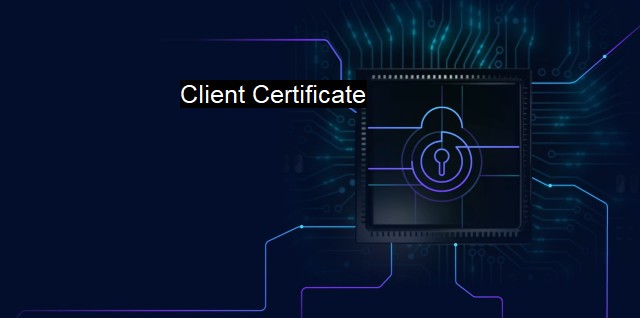What is Client Certificate?
Client Certificate: Enhancing Cybersecurity & Antivirus Measures for Secure Communication and Data Protection
The term “client certificate” is fundamentally important. A client certificate, otherwise known as a digital certificate or identity certificate, is a type of digital identity document, akin to an electronic passport. It is a specific type of electronic document that implements the Secure Socket Layer (SSL) or Transport Layer Security (TLS) protocols for validating and verifying the identity of an individual client or user over an unsecured network such as the internet. The SSL/TLS protocols are cryptographic protocols that secure networks by encrypting communication.The use of client certificates is crucial as they provide a secure connection during the transfer of sensitive data between a client and a server. A server cannot recognize a client without this certificate, as it provides authentication in online, digital transactions. Therefore, client certificates play a significant role with their primary purpose being to support application-level authentication and secure channeling of data on a per-exchange basis.
Every client certificate is issued to individual clients by a Certificate Authority (CA). The CA serves as a trusted third party, ensuring security between the client and the server. Each client certificate consists of a public key and a private key. The public key, as implied, is made publicly available, whereas the private key is kept confidential by the user. The two keys are genuinely unique and intertwined. The private key is used for signing and decryption, while the public key is used for verification and encryption purposes.
A core characteristic of client certificates is that they can only be issued after a process is carried out to validate the credentials of the applicant. This process is often referred to as vetting. When used in conjunction with a private key, the client certificate offers proof-positive of the client's identity to the server.
In introduction of client certificates and SSL/TLS protocols, there has been a substantial reduction in data breaches and cyberattacks. Client certificates provide a substantial level of security as they help to prevent unauthorized access, significantly reducing the risk of private information interception by hackers or any form of cyber crime.
They aid in guaranteeing the confidentiality of communication between the client and the server. Attackers are unable to decipher the transmitted information between the client and server due to encryption. client certificates ensure the integrity and verifiability of data as any attempts to tamper with the message during transmission can be swiftly detected by decrypting the data with the sender's public key.
The client certificate comes in handy during mutual TLS. Mutual TLS is an enhanced security protocol whereby both parties in a communication exchange, the client and the server, identify each other through digital certifications. During mutual TLS, the client also validates the server's certificate and then offers their own for validation. This reciprocal authentication process provides an additional layer of security during data transactions and exchanges.
Client certificates form an integral part of antivirus software. They enhance the effectiveness of antivirus software by incorporating SSL/TLS protocols. These protocols ensure that data shared over networks is encrypted, thereby shielding the user's computer from various forms of malicious attacks. These attacks can vary from unauthorized access to the injection of malware, which can cause significant damage to the system.
Though each client certificate has a predetermined lifespan and can be revoked if compromised, they constitute an invaluable defense mechanism against cyber threats. Given the ever-evolving landscape of cyber crime, it is expected that new developments will continuously adjust client certificate protocols to meet arising security challenges. With the utilization of client certificates, individuals and organizations alike can uphold the integrity of their digital interactions and data transmissions, significantly preventing hostile cyber operations.

Client Certificate FAQs
What is a client certificate?
A client certificate is a digital certificate used to authenticate a client during an SSL/TLS handshake. It is used as an additional layer of security to verify the identity of the client accessing a server.How does a client certificate improve cybersecurity?
A client certificate improves cybersecurity by ensuring that only authorized clients with the appropriate certificate can access a server. This prevents unauthorized access and protects against man-in-the-middle attacks.What is the difference between a client certificate and an antivirus?
A client certificate is used to authenticate a client during an SSL/TLS handshake, while an antivirus is used to scan and detect malware on a device. A client certificate helps secure the connection between client and server, while an antivirus protects the device from malware infections.Do I need a client certificate for online transactions?
Some websites may require a client certificate for online transactions as an additional layer of security. However, not all websites require it. It is best to check the website's security protocols to determine if a client certificate is necessary.| | A | | | B | | | C | | | D | | | E | | | F | | | G | | | H | | | I | | | J | | | K | | | L | | | M | |
| | N | | | O | | | P | | | Q | | | R | | | S | | | T | | | U | | | V | | | W | | | X | | | Y | | | Z | |
| | 1 | | | 2 | | | 3 | | | 4 | | | 7 | | | 8 | | |||||||